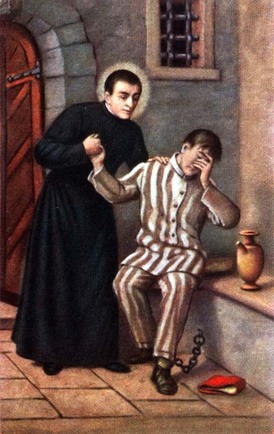 Joseph Cafasso, a native of Piedmont, Italy, was of humble origins. He was ordained priest in 1833 after studies in the Turin seminary and at the Institute of St. Franics.
Joseph Cafasso, a native of Piedmont, Italy, was of humble origins. He was ordained priest in 1833 after studies in the Turin seminary and at the Institute of St. Franics.
Pope Benedict XVI referred to St Joseph Cafasso as one of the “social saints.” In 2010 he said,
“In addition, I would like to recall that on 1 November 1924, in approving the miracles for the canonization of St John Mary Vianney and publishing the Decree authorizing the beatification of Cafasso, Pius XI juxtaposed these two priestly figures with the following words: ‘Not without a special and beneficial disposition of Divine Goodness have we witnessed new stars rising on the horizon of the Catholic Church: the parish priest of Ars and the Venerable Servant of God, Joseph Cafasso. These two beautiful, beloved, providently timely figures must be presented today; one, the parish priest of Ars, as small and humble, poor and simple as he was glorious; and the other, a beautiful, great, complex and rich figure of a priest, the educator and formation teacher of priests, Venerable Joseph Cafasso.'”
Father Joseph had a deformed spine which did not hinder his brilliance in moral theology. Two things made him notable of his time: he actively opposed the heresy of Jansenism, and he fought state intrusion into Church affairs. Hence his popularity in teaching.
While Father Joseph had administrative duties his best and singularly most important work was his personal connection he had with young priest-students, his renown holiness and insistence on discipline and high standards; his compassion and guidance as confessor and spiritual adviser, and his ministry to prisoners. One of the interesting things Father Joseph recommended to his seminary students was their joining the Secular Franciscan Order very likely because it would give a structure to their spiritual and pastoral life. All this gives rise to Benedict XVI saying that Cafasso had “a school of priestly life and holiness.”
Ahead of his time Father Joseph preached daily Communion and regular adoration of the Blessed Sacrament.
Saints beget saints. Joseph met John Bosco in 1827 and the two became good friends. Bosco credits Joseph’s encouragement that led to the latter’s work with boys. The religious institute founded by Bosco was advocated by Joseph who asked benefactors to support. Father Joseph was canonized in 1947.
It was Pope Pius XII who declared St Joseph Cafasso the Patron of Italian prisons on 9 April 1948, and, held him up as a model to priests engaged in Confession and in spiritual direction (cf. Apostolic Exhortation Menti Nostrae, on 23 September 1950).
May St Joseph Cafasso teach us to be clear in our doctrine, engaged in the lives of the needy, and firm in our love of the Lord through eucharistic devotion. Can we today, imitate what was said of St Joseph’s secret: to be a person of God; to do in small daily actions “what can result in the greater glory of God and the advantage of souls”?
